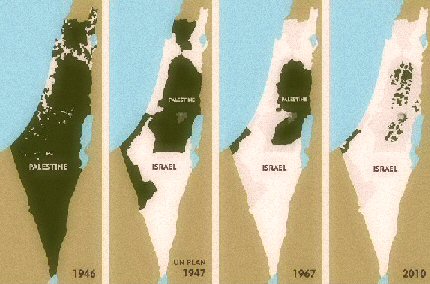Illegal expansion of ‘Jewish only’ settlements continued unabated, in various parts of the occupied West Bank on Tuesday, with further demolition notices and destruction of Palestinian property by Israeli settlers.Israeli police served demolition orders, on Tuesday, for a number of Palestinian-owned homes in the neighborhoods of Silwan and Jabal al-Mukabir, under the pretext of construction without legal permits, according to local sources.
Witnesses told WAFA correspondence that a staff from the Israeli municipality of West Jerusalem invaded Silwan and handed two local residents orders for demolition of their homes on “unpermitted construction” grounds.
Meanwhile, the Israeli municipality also served two local residents of Jabal al-Mukabir notices to demolish their homes, despite the fact that one of the two has a valid construction permit.
The latest demolition orders come only a day after similar notices were handed to residents of Silwan, Jabal al-Mukabir and Sur Baher for unpermitted construction.
Issuance of construction permits for Palestinian residents of East Jerusalem has been tightly restricted, WAFA reports, and, in case a permit is issued, the holder is forced to pay skyrocketing fees. This has led many Palestinians in Jerusalem to construct without obtaining a permit to shelter their families.
Meanwhile, in the village of Issawiya, to the north of Jerusalem, the Israeli municipality ransacked a Palestinian-owned shop. Prior to the assault, the shop’s owner, identified as Nader Richeq, had won an Israeli court’s ruling under which the demolition of his property was to be annulled.
Richeq’s workshop reportedly employs a number of workers and is considered a source of livelihood for at least 10 Palestinian families.
The orders came despite a noticeable surge in mass protests that had struck the city, beginning last June. However, such protests have significantly decreased in number, following mass arrests carried out by Israeli police in and around neighborhoods in occupied East Jerusalem.
Since then, at least 600 Palestinian children were arrested in the city, 40% of whom were exposed to sexual abuse during arrest or investigation by the Israeli authorities, according to the Palestinian Prisoner’s Club (PPC).
An attorney with PCC, also reported on other violations during the apprehension of children, including, to name just a few, night and predawn raids on family homes, physical abuse, and sexual abuse.
See also: 11/27/14 Israel Takes Record for World’s Youngest Prisoner, 11 Months Old
Also, on Tuesday, the Israeli army confiscated three Palestinian owned tractors in the village of Khirbet Ibzeq, in the northern Jordan Valley, according to local sources.
Aref Daraghmeh, head of Al-Maleh local council, which gathers a number of small Bedouin villages into one municipal congregation, said that an Israeli army force stormed the village and confiscated three tractors owned by local villagers.
Earlier in the morning, Bedouins and villagers from the Tubas governorate were allowed to cultivate an agricultural area close to the border with Jordan before army ordered the farmers out.
Entry to the area, locally known as Ein Sakout, has been prohibited since Israel occupied the West Bank in 1967, as Israel used it as a live-fire and training zone.
To be noted, Israel has heavily invested in transferring the Jordan Valley into a completely Israeli area, primarily of agricultural value, targeting to ban direct connectivity between a future Palestinian state and the rest of the Arab world.
To this end, tens of settlements and agricultural outposts have been established by Israel in the Valley, which makes up about one-third of the total area of the occupied West Bank.
Significantly contributing to Israeli agriculture, the Valley is nonetheless part of the ‘occupied’ West Bank since 1967, a claim which the international community refuses to recognize.
See: 12/10/14 Palestine Takes on Observer Status at the ICC
WAFA further reports that Israeli authorities have, in recent years, earmarked around 35,000 dunams of land in the West Bank, currently used by the Israeli army as firing zones, for the purposes of settlement expansion.
According to Haaretz, in the 1970s, approximately a million dunams in the West Bank were declared firing zones for the exclusive use of the Israel army. Until the 1990s, such areas were used extensively for training.
After the Israeli military moved training bases to southern Israel, following the Oslo Accords, the use of firing zones in the West Bank declined and most are now abandoned or used only sporadically for training.
Nevertheless, the Israeli army continues to control these areas, keeping Palestinians out and demolishing buildings that are sometimes constructed there.
A May 2014 account by an Israeli army officer revealed that military training in live-fire zones in the West Bank are simply a justification to reduce the number of Palestinians living in close proximity.
Israeli settlers, on Tuesday morning, cut the wires of four power poles and chopped down several olive trees east of Burin village, to the south of Nablus.
Ghassan Daghlas, who monitors settlement activities in northern West Bank, said that several individuals from Bracha, an illegal settlement outpost, broke into the eastern part of Burin, where they vandalized and attempted to steal the wires of power poles and broke the street lights in the area.
The settlers also chopped down several olive trees.
Israel has confiscated 854 dunams from Burin village (7% from the total village area of Burin) for the establishment of two settlements; “Bracha”, to the north-east of the village, and “Yitzhar”, to the south-west of the village.
Israel has confiscated 630 dunums from Burin village for the establishment of Huwwara military base near Huwwara checkpoint. According to the Applied Research Institute – Jerusalem, a total of 2,875 Israeli settlers now live in these settlements.
See 11/05/14 Stealing the Land, Inch by Inch

